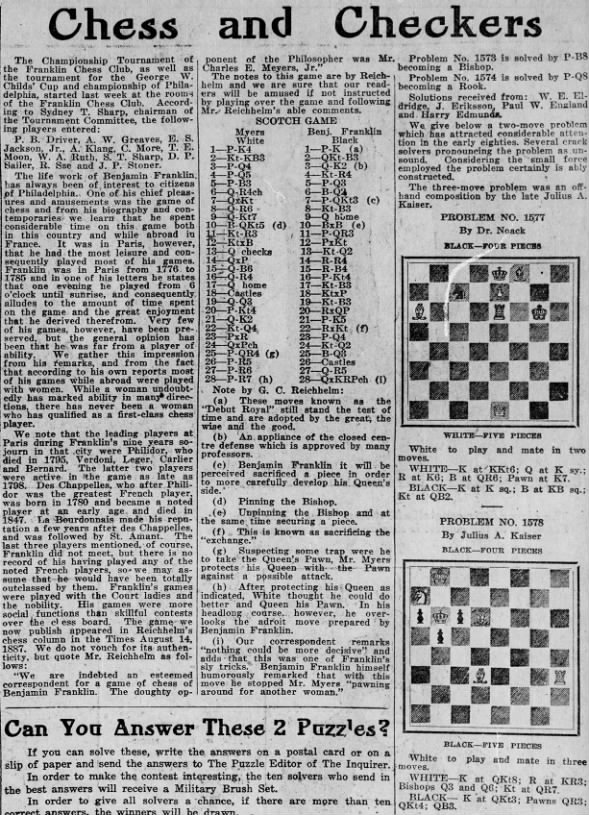 Chess and Checkers 25 Jan 1920, Sun The Philadelphia Inquirer (Philadelphia, Pennsylvania) Newspapers.com
Chess and Checkers 25 Jan 1920, Sun The Philadelphia Inquirer (Philadelphia, Pennsylvania) Newspapers.com
The Championship Tournament of the Franklin Chess Club, as well as the tournament for the George W. Childs' Cup and championship of Philadelphia, started last week at the rooms of the Franklin Chess Club. According to Sydney T. Sharp, chairman of the Tournament Committee, the following players entered…
The life work of Benjamin Franklin has always been of interest to citizens of Philadelphia. One of his chief pleasures and amusements was the game of chess and from his biography and contemporaries we learn that he spent considerable time on this game both in this country and while abroad in France. It was in Paris, however, that he had the most leisure and consequently played most of his games. Franklin was in Paris from 1776 to 1785 and in one of his letters he states that one evening he played from 6 o'clock until sunrise, and consequently alludes to the amount of time spent on the game and the great enjoyment that he derived therefrom. Very few of his games, however, have been preserved, but the general opinion has been that he was far from a player of ability. We gather this impression from his remarks, and from the fact that according to his own reports most of his games while abroad were played with women. While a woman undoubtedly has marked ability in many directions, there has never been a woman who has qualified as a first-class chess player.
We note that the leading players at Paris during Frankline's nine years sojourn in that city were Philidor, who died in 1795, Verdoni, Leger, Carlier and Bernard. The latter two players were active in the game as late as 1798. Des Chappelles, who after Philidor was the greatest French player, was born in 1780 and became a noted player at an early age and died in 1847. La Bourdonnais made his reputation a few years after des Chappelles, and was followed by St. Amant. The last three players mentioned, of course, Franklin did not meet, but there is no record of his having played any of the noted French players, so we may assume that he would have been totally outclassed by them. Franklin's games were played with the Court ladies and the nobility. His games were more social functions than skillful contests over the chess board. The game we now publish appeared in Reichhelm's chess column in the Times August 14, 1887. We do not vouch for its authenticity, but quote Mr. Reichhelm as follows:
“We are indebted an esteemed correspondent for a game of chess of Benjamin Franklin. The doughty opponent of the Philosopher was Mr. Charles E. Meyers, Jr.”
The notes to this game are by Reichhelm and we are sure that our readers will be amused if not instructed by playing over the game and following Mr. Reichhelm's able comments.






















